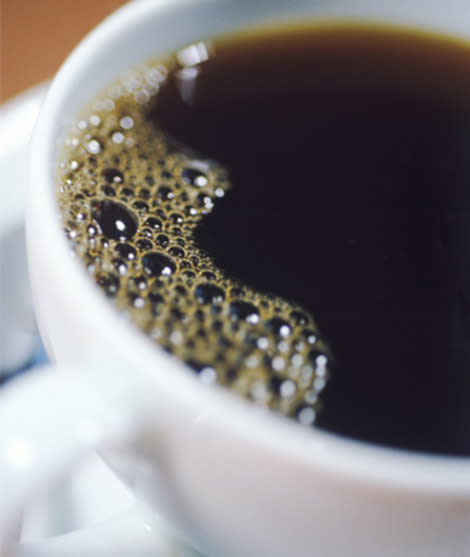Get More from Your Coffee and Tea

By Cynthia Sass, MPH, RD
You may start your day with a hot or iced latte or 'medicine in a mug' (my nickname for tea), but how about folding a little into your meals? Here's why they're so beneficial and some healthy ways to eat them:
Coffee
In moderation, I consider coffee to be a pretty potent health food. Coffee beans are actually the seeds inside a bright red berry, which is sometimes called a coffee cherry. Like nearly all plant based foods, both the berries and the seeds are rich in antioxidants . In fact a recent study found that java is the No. 1 source of antioxidants in the American diet. That may be one of the reasons its consumption is linked to a lower rate of a number of diseases. A recent study that followed a Native American population for more than seven years, where the prevalence of diabetes was between 40 and 70 percent, found that people with the highest coffee intakes had a 67 percent lower risk of developing diabetes compared to non coffee drinkers. Other research shows that compared to non-coffee drinkers, those who indulge are likely to experience a lower risk of colon cancer , liver cirrhosis, gallstones, and Parkinson's.
RELATED: 10 Delicious Hot Drinks That Won't Pack on the Pounds
How to Eat:
These studies aren't a green light for cranking up your intake to a pot a day, but it's good to know that if you have no intention of giving up your morning cup of Joe, it may provide some disease protection. I recommend sticking with one cup in the morning, jazzed up with organic skim milk or a dairy free alternative (soy, hemp, etc.) for a little protein and calcium, along with spices like cinnamon and nutmeg, which offer an extra antioxidant boost. Or on those mornings when I need a little more kick I toss one teaspoon of freshly ground coffee beans to my smoothie (it's awesome with frozen cherries, almond butter, organic skim or soy milk and a scoop of rolled oats).
Tea
I adore tea - black, green, white, oolong, hot, iced, spiced - so I'm thrilled that it's such an amazing superfood. Studies show that tea is tied to better bone density, slower bone loss, a stronger immune system and a reduction in belly fat. Regular tea drinkers also have a 20 to 30 percent lower risk of heart disease and 40 to 60 percent lower risk of stroke, probably because the potent antioxidants tea packs fight inflammation and prevent blood vessels from hardening. Tea also boosts brain health . One study found that Japanese adults who sip more than two cups a day had over a 50 percent lower risk of age-related memory declines compared to those who drank less than three cups a week. It's is also an effective energy booster - rats given green tea were able to swim 24 percent longer before becoming exhausted, but it's lower in caffeine than coffee - 1 cup only provides 25 to 50 mg of caffeiene, compared to about 100 mg in java. And finally, tea is a major anti-ager. Research shows that the cells of regular tea drinkers have a younger biological age than non-drinkers.
RELATED: The Best Low-Calorie Cocktails for Fall
How to Eat:
In my newest book I include tea as both a beverage and a natural seasoning. I whip loose tea leaves into smoothies, combine them with pepper and other herbs like thyme as a rub for chicken or tofu, or use brewed tea as a marinade for shrimp. It also makes a flavorful liquid for steaming veggies, or as a broth for soup, whole grain noodles or whole grain rice. Sipped or swallowed, it's a great way to enjoy both flavor and health benefits!
More on SHAPE:
15 Creative Alternatives to Coffee
5 Surprising Drinks That Aren't Vegan
Are You Addicted to Diet Soda?
